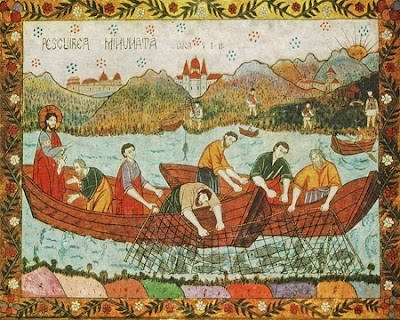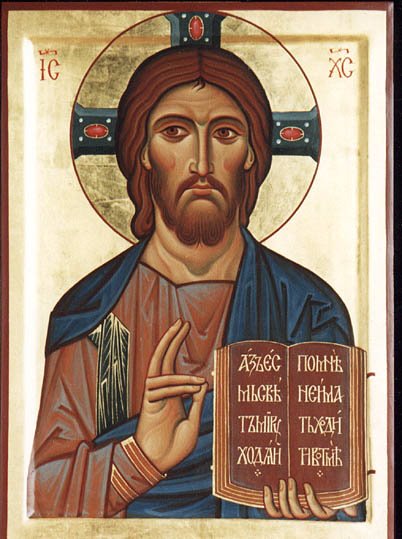Mark 8:1-9; Romans 6:19-23; Genesis 2:7-17
In the Name of the Father and of the + Son and of the Holy Spirit.
The crowd had been following Jesus for three days. However, it wasn’t until the third day that anyone expressed concern that they just might be hungry, and that wasn’t someone from the crowd, but it was Jesus Himself. Now, why is that? It is because the crowd was being fed all along with the Bread of Life, the Word of God, proclaimed to them by the Word made flesh, Jesus Christ. You’ll remember that Satan once tempted Jesus to assuage His forty-day hunger by turning stones into bread. Then, Jesus answered Satan saying, “Man does not live by bread alone, but by every Word that proceeds from the mouth of God.” For three days Jesus had been feeding them the Bread of Life – the very Word that proceeds from the mouth of God – identifying the lies they had been following, calling them to repent of their sinful dissatisfaction, forgiving them of their sins, and thus delivering them from the lies to the truth that gives real satisfaction and everlasting life in the kingdom of Heaven.
For, the trouble with us sinful people is that we always want to eat what isn’t good for us, what doesn’t bring nutrition, health, and life, but only malnutrition, illness, and death. It’s about what we take into our bodies and into our souls, what we feed on, what we trust in, and what we derive life from. That is why the LORD uses the analogy of bread to describe the importance and centrality of His Word for our life. Bread is a staple, a fundamental source of nourishment, energy, strength, and life. Like our First Parents before us, we flee from the wholesome food of the Bread of Life, God’s Word, and instead we fill our ears and our souls with junk food, with garbage, lies, and deceit. Truly, St. Paul’s prophetic words have been fulfilled today even as they were in His own time, “the time is coming when people will not endure sound teaching, but having itching ears they will accumulate for themselves teachers to suit their own passions, and will turn away from listening to the truth and wander off into myths.”
Yet, the crowd following and listening to Jesus those three days hadn’t expressed that they were hungry – which is quite amazing if you think about it! Still, Jesus had compassion on them. That word compassion in the Greek is a wonderful word splachnizomai. It literally means a churning of the bowels. Splachnizomai is a gut-wrenching feeling of empathy for the suffering of another. That is what Jesus felt for the people that had followed Him three days listening to His Word and teaching. That is what it means that Jesus had “compassion on the crowd.” Jesus knew their need even before they did. He knew that they needed physical nourishment just as much as spiritual nourishment. Thus, Jesus also taught them, “Do not be anxious about your life, what you will eat or what you will drink, nor about your body, what you will put on. Is not life more than food, and the body more than clothing? Look at the birds of the air: they neither sow nor reap nor gather into barns, and yet your heavenly Father feeds them. Are you not of more value than they?”
Thus, what is revealed in today’s Gospel is not only the necessity and the priority of the Word of God, the Bread of Life, for true life with God, but we also see Jesus’ humanity and union with us, the meaning of His Incarnation. We see God’s love and compassion for us, how He knows us so intimately, as only a Creator can truly know His creatures whom He has made and formed and knitted together in our mother’s wombs, whose days He knows before ever one came to pass. This is what it truly means to have compassion: to suffer with, to suffer alongside of. For, inasmuch as the crowd had been listening for three days, so too, had Jesus been teaching and preaching for three days. He was in the same boat as them, so to speak. He was hungry too. He felt compassion – He felt what they were feeling – and so He was moved to act. However, knowing their need, personally, Jesus also knew their weakness personally. And, later, in His own time of need, Jesus would say to His disciples in Gethsemane who were heavy with sleep, “The spirit is willing, but the flesh is weak.”
The disciples demonstrated the weakness of their flesh in their answer to Jesus, “How can one feed these people with bread here in this desolate place?” No doubt if they were in the village or city they would have been assured at the presence of bakers and fishmongers, but, seeing nothing but barrenness and desolation, their assurance was gone and their hope lost. Therefore, Jesus gently taught them to trust not in the flesh, or in material things, what their eyes saw, and what their human reason and wisdom expected, but to trust in the Word of God. Jesus asked them how many loaves they had. It was not because He did not Himself know, but it was to bring into the light the meagerness and the insufficiency, the hopelessness of their own provisions. For, until we are able to confess our sinfulness and our inability to restore ourselves, we are unable to receive the benefit of the Gospel, the Good News, that we have been forgiven and restored to a right relationship with our God and Creator through faith in Jesus Christ who has redeemed us and has set us free. Then Jesus directed the crowd to sit down on the ground. It would not be by their works, by their reason, by their strength, or even by their faith that their bellies would be filled, but it would be by the Word of God, now pressing their meager offerings into life-giving and life-sustaining service.
Jesus caused the disciples and the crowd to become aware of their hunger and their insufficiency. When you feed your bellies with junk food and garbage, you have the sensation of being full and satisfied, while your bodies are literally starving to death for nutrition. Our ears and our brains and, consequently, our souls are so filled with the junk food and garbage of the world’s wisdom, values, cares, and anxieties that we, too, would be spiritually starving to death were it not for our frequent eating, hearing, and receiving of the Bread of Life, the Word of God. When they became aware of the meagerness of their provisions, their first reaction was that of unbelief, hopelessness, and despair. But, the Lord took their meager provisions, seven loaves and a few small fish, and with them fed them all until they were satisfied, and then collected seven baskets full of leftovers. When the LORD fills your cup, it overflows in abundance. Only consider these words of promise that He gives you: “Good measure, pressed down, shaken together, running over, will be put into your lap.” “I am the bread of life; whoever comes to me shall not hunger, and whoever believes in me shall never thirst.” “Whoever drinks of the water that I will give him will never be thirsty again. The water that I will give him will become in him a spring of water welling up to eternal life.” Whenever the LORD gives, He gives in abundance. His mercy and His generosity are far greater than our actual needs, as is His love far greater than our sins.
The LORD’s miracles of feeding His people are plenteous throughout the Holy Scriptures. From the very beginning, in the Garden, the LORD provided food for nourishment of the body to which He attached His Word that nourished the soul. The Passover meal was a sign of His providence as He led His people out of slavery and bondage in Egypt into the land of promise. He provided manna, quail, and water to sustain His people forty years in the wilderness. In the sacrifices of the tabernacle and the temple, the LORD attached His Word of promise to bread and meat, oil and wine, to show His favor and blessing upon His people. The LORD sustained Elijah, the widow, and her son throughout the drought and famine, the jar of flour not being spent nor the jug of oil empty. Jesus had already fed over five thousand with bread and fish before performing this miracle again in the feeding of the four thousand, indicating that He may have done this several more times throughout His ministry. And, the night on which He was betrayed, He pressed meager bread and wine into divine and holy service in the Last Supper, promising through His Word, that those who ate and drank received Himself in holy communion for the forgiveness of sins, the strengthening of faith, and life that cannot die. Our Lord Jesus Christ continues to press our meager provisions of bread and wine into divine and holy use in the Sacrament of the Altar where we eat His flesh and drink His blood in His promise that, “Whoever feeds on my flesh and drinks my blood has eternal life, and I will raise him up on the last day.”
Like Martha, we too easily become distracted by worldly and fleshly cares and anxieties. We see violence, warfare, and bloodshed in the world and we are fearful. We are tempted to think that we are alone and must solve these problems on our own or suffer in isolation. Likewise, we similarly despair at our meager provisions to support our congregation and the ministry in this place. We see empty seats and less and less money in the plate, and we know that people are not beating down our doors to come in. And so, we are tempted to believe that we must do something, we must fix things, or slowly decline until we have to close our doors. “How many loaves do you have?” Jesus asks. Yes! Confess the meagerness of your provisions, your inability to dig yourself out of your self-made sin-hole, your grave, your death, and look to Jesus, the Bread of Life who provides you daily bread, all that you need for your body and your life. He takes up our meager provisions and He presses them into service to feed and to nourish, to strengthen and to protect, and then to send you out into the world, to your neighbor, through your vocations, to share the Bread of Life you yourself have received in superabundance.
Come, taste of the bounty of Eden restored in this Feast of the Bread of Life, Jesus Christ. His flesh is true food, and His blood is true drink. “This is the bread that came down from heaven, not like the bread the fathers ate, and died. Whoever feeds on this bread will live forever.”
In the + Name of Jesus. Amen.




.jpg)

